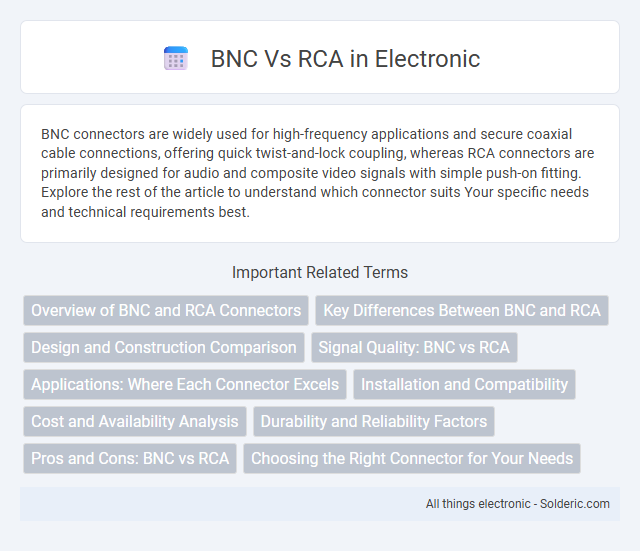BNC connectors are widely used for high-frequency applications and secure coaxial cable connections, offering quick twist-and-lock coupling, whereas RCA connectors are primarily designed for audio and composite video signals with simple push-on fitting. Explore the rest of the article to understand which connector suits Your specific needs and technical requirements best.
Comparison Table
| Feature | BNC Connector | RCA Connector |
|---|---|---|
| Type | Bayonet Neill-Concelman | Radio Corporation of America |
| Usage | Video signals, RF applications, test instruments | Audio signals, composite video, consumer electronics |
| Connection Mechanism | Bayonet lock | Push-in (friction fit) |
| Signal Type | Typically 75 or 50 ohm coaxial | Unbalanced analog audio/video |
| Frequency Range | DC to 4 GHz (depending on type) | Up to ~100 MHz (video) |
| Cable Type | Coaxial cable (RG-58, RG-59) | Coaxial or unshielded cables |
| Common Applications | Professional video, broadcast, networking (10BASE2) | Home audio/video systems, gaming consoles |
| Impedance | 50 or 75 ohms | Typically 50-75 ohms, but not impedance matched |
| Durability | Robust, secure connection | Less secure, can loosen over time |
Overview of BNC and RCA Connectors
BNC connectors feature a bayonet-style locking mechanism providing secure, reliable connections commonly used in professional video, radio frequency, and test equipment. RCA connectors utilize a simple push-in design favored for consumer audio and video applications, offering ease of use but less mechanical stability. Both connectors transmit analog signals, with BNC supporting higher frequency ranges and more robust applications compared to RCA's typical use in low-frequency audio and composite video signals.
Key Differences Between BNC and RCA
BNC connectors feature a bayonet locking mechanism providing secure and reliable connections ideal for professional video and RF applications, while RCA connectors utilize a simple push-in design commonly used for consumer audio and video equipment. BNC cables support higher frequency signals and are preferred in broadcast environments due to their low signal loss and durability. RCA connectors, although easier to connect, typically offer lower signal integrity and are best suited for everyday home entertainment systems.
Design and Construction Comparison
BNC connectors feature a bayonet-style locking mechanism that ensures secure, vibration-resistant connections ideal for professional video and RF applications. RCA connectors, with their simple push-in design, prioritize ease of use and quick plug-and-play installation, commonly found in consumer audio and video equipment. Your choice between BNC and RCA should consider the sturdiness required in your setup, as BNC offers superior durability and signal integrity in demanding environments.
Signal Quality: BNC vs RCA
BNC connectors provide superior signal quality compared to RCA connectors due to their locking mechanism and better shielding, which minimizes interference and signal loss. RCA connectors are more prone to signal degradation over longer distances, making BNC ideal for professional video and radio frequency applications. For your setup, choosing BNC ensures more stable and higher-quality signal transmission.
Applications: Where Each Connector Excels
BNC connectors excel in professional video and radio frequency applications, commonly used in CCTV systems, broadcast equipment, and test instruments due to their secure locking mechanism and reliable signal integrity at high frequencies. RCA connectors are ideal for consumer audio and video devices such as home theater systems, DVD players, and gaming consoles, providing simple and cost-effective connections for analog signals. Your choice depends on the need for robust, high-frequency performance with BNC or straightforward, user-friendly connections with RCA.
Installation and Compatibility
BNC connectors are designed for secure, twist-lock installation commonly used in professional video and RF applications, ensuring reliable connections without signal loss. RCA connectors feature a simple push-in design compatible with most consumer audio and video devices, making them easy to install but less secure under movement or stress. Your choice depends on the required installation robustness and device compatibility, with BNC favored for professional setups and RCA for everyday consumer electronics.
Cost and Availability Analysis
BNC connectors generally offer a more cost-effective solution compared to RCA connectors, especially for professional and industrial applications where durability and signal integrity are critical. RCA connectors remain widely available and popular for consumer audio and video equipment, often resulting in lower prices due to mass production and broad retail distribution. Your choice depends on balancing budget constraints with the specific availability of connectors suited to your technical needs.
Durability and Reliability Factors
BNC connectors feature a robust bayonet locking mechanism that ensures secure, stable connections resistant to vibration and environmental stress, making them highly durable for professional video and RF applications. RCA connectors, while convenient and widely used in consumer audio and video devices, typically rely on friction-fit connections that are more prone to wear and signal degradation over time. The metal construction and locking design of BNC connectors provide superior reliability and long-term performance compared to the simpler, less secure RCA connectors.
Pros and Cons: BNC vs RCA
BNC connectors offer superior signal integrity and secure locking mechanisms, making them ideal for professional video and radio frequency applications, but they tend to be bulkier and more expensive than RCA connectors. RCA connectors are widely used for consumer audio and video equipment due to their simplicity and lower cost, though they lack the robust connection and shielding found in BNC connectors, leading to potential signal degradation. Choosing between BNC and RCA depends on the application's need for signal quality, durability, and budget constraints.
Choosing the Right Connector for Your Needs
Choosing the right connector for your needs depends on the specific application and signal type, with BNC connectors ideal for professional video and RF equipment due to their secure bayonet locking mechanism and high-frequency performance. RCA connectors are commonly used for audio and composite video signals, offering ease of use and broad compatibility in consumer electronics. Your decision should prioritize signal integrity, connection stability, and device compatibility to ensure optimal performance.
BNC vs RCA Infographic

 solderic.com
solderic.com